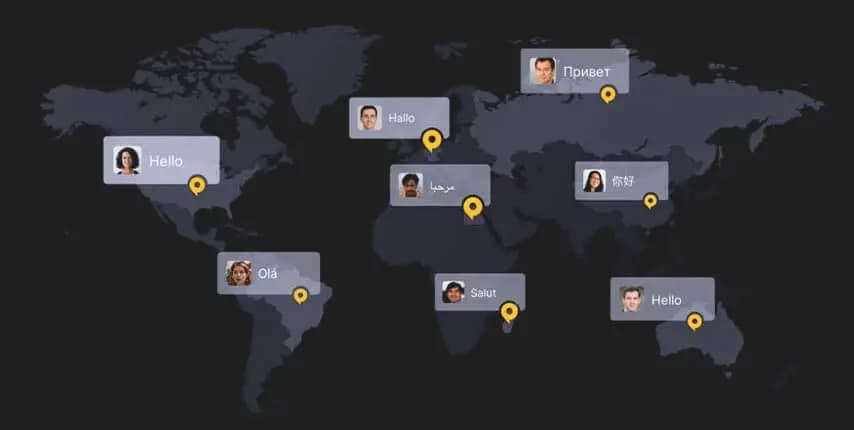E-learning localization
To become and maintain being one of the top E-learning companies, localization/translation is a necessity to decrease the barrier for potential customers around the world. Selecting the right localization partner is the key towards your globalization journey, that is why the organization needs to ensure selecting the right vendor to deliver the quality expected for the target language, for your organization to get the needed impact without having to sacrifice time or finances.
Before settling on the right vendor for your organization, you must consider your current capabilities in terms of expertise and whether you’ll need to have new skills on board or coordinate with your service provider.
Below are some of skill sets that E-learning projects typically require from the vendor:
Instructional Designer: develops the entire course curriculum from A to Z.
Content Writer: works very closely with the instructional designer to further expand the content they developed.
Subject Matter Expert (SME): works closely with both the instructional designers and content writers to further develop the content and thoroughly review it at every stage.
Graphic Designer: creates the visual element based on the descriptions provided by the content writers and SMEs.
Programmer: creates a fully functional course by putting the content, visuals and other elements all together.
Quality Checker: keeps on running the course looking for any errors that might have been missed out on and reporting it back before going live, error-free.
Project Manager: brings all the resources together to ensure the project is completed in a timely manner without exceeding the set budget.
After being briefed about the skill sets needed, let’s go through some of the most important tips an organization needs to have in mind while choosing their E-learning localization provider.
8 tips to be considered when selecting the right E-learning localization/ translation vendor-partner:
Tip 1: Check the vendor’s service profile
Throughout the research process to find the right E-learning localization provider for your organization, check the vendor’s service profile to get an overall understanding of what your upcoming partner has to offer. The service profile usually includes:
When the vendor was founded
Certifications and accreditations received
Services offered
Professionals on board along with their years of expertise
Fields of expertise the vendor worked in
Clients
Software platforms used by the vendor
Localization project workflow
Quality assurance
After going through the vendor’s service profile, you should be able to decide whether to contact the company to get more details or to go on with your research process.
Tip 2: Check if the vendor has at least 5 years of experience in the E-learning domain
The overall years of experience isn’t what usually matters, but it’s the years of expertise in your own field. So, if you want to translate your E-learning content, make sure your vendor has years of experience in E-learning domains, in particular.
Tip 3: Check if the vendor has experience in handling global clientele
For your organization to go global, your E-learning content will need to be translated into multiple languages to reach a wider audience and that is why the organization must take the vendor’s language experience into consideration. You must check the vendor’s global clientele and ensure it has carried out a considerable amount of E-learning translations in languages relevant to your own needs. Also, the more global experience the vendor has, the quicker and more efficient your E-learning content will be integrated into the target languages.
Tip 4: Check if the vendor has an effective Project Management Process/Quality Practices, working process and methodology
It’s a great sign if the localization vendor has worked with well-known clients that happen to be repeatedly working with this one same vendor for a long period of time. It could be an indication that the vendor understands the importance of delivering quality work that is effective for the target audience while having an effective Project Management Process.
It’s very important to understand the process that follows the translation prior to and after implementation. For example: for how long will the translation vendor train your translators on the product, will your translation partner review the source files before translation to identify any future problems that might occur. As for after implementation, will there be a thorough linguistic and technical review? Will there be a Q&A round for testing to ensure nothing was linguistically disturbed during the translation process?
To ensure that the localization process goes in the smoothest and most efficient way, you will need a vendor/ partner with robust, structured project management that ensures constant communication along the way so that any changes needed to be made, take place through a systematic process.
Tip 5: Check if the vendor has expertise in instructional design
Instructional designers don’t only plan, design and develop educational experiences to maximize the learner’s success, they combine a mix of psychology, creativity and innovation to create a well rounded learning experience. The instructional designers in your vendor partner should have certain skills and those include: being flexible and resourceful, being creative with visual design skills, understanding E-Learning tools and LMS, having detailed project management and analytical skills, understanding the current technology and educational landscape.
Tip 6: Check if the vendor is proficient in using authoring tools
Authoring tools are what helps create a real and maximised business impact, as it does not only grab the learners attention, but keeps their attention. This happens through the authoring tools keeping the users engaged by making the interactions they have with the content: timely, relevant to their needs and helps them get their job done. Furthermore, vendors that use authoring tools are typically quicker in creating online training materials which cuts out the time-consuming process and the possible expenses associated with expensive developers to produce content for your Learning Management System, for example.
Tip 7: Check if the vendor is willing to provide references from existing clients
The number of years the vendor has been in the industry does not necessarily prove it being right for an organization’s needs. For example, it could be a very well-known E-learning translation provider that does translate documents from arabic to english but does not voice translate arabic to english which is what your organization needs. So, through the samples from existing clients, the client would be able to anticipate the level of expertise and the quality that will be provided.
Tip 8: Check if the vendor provides additional services besides localization/translation
For instance, does the localization vendor also happen to be a leading eLearning vendor? Being a double up makes the process of the online course localization easier as the vendor is already familiar with the eLearning localization process and has the required expertise, thus the time taken to translate the content would be relatively lower than other vendors as the experience of planning ahead tends to be simpler. Also, this could mean that the organization could rely on the vendor to provide a Learning Management System to host the eLearning courses online.
Are you currently in the process of choosing a localization/ translation company for your global growth?
Saudisoft has the answers to all your questions regardless of your niche industry or target market as we have been connecting dots to globalization since 1983 with a 100% dedicated team of Project Managers and experienced linguists highly specialised in authoring tools and Bi-Di languages. In addition to having strong partnerships with major localization vendors from all over the world.
Customer satisfaction always being Saudisoft’s number one goal, our tech-enthusiasts are continuously examining and improving all the automated operational procedures and controls, thus ensuring meeting the set deadlines. Also, our Quality Management System ensures error-free work while following high-quality standards in accordance with our ISO 9001-2015, the world’s most recognised Quality Management System (QMS) standard and ISO 17100 certifications.






